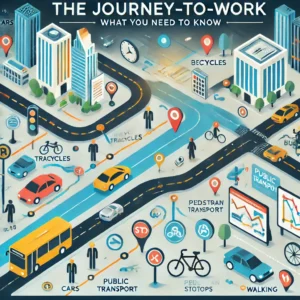The Journey-to-Work: What You Need to Know
 The daily commute is an integral part of many people’s lives but is also a significant contributor to environmental issues. As we become more aware of our impact on the planet, it’s crucial to consider how we can make our journeys to work more sustainable. Here’s what you need to know about creating an eco-friendly commute.
The daily commute is an integral part of many people’s lives but is also a significant contributor to environmental issues. As we become more aware of our impact on the planet, it’s crucial to consider how we can make our journeys to work more sustainable. Here’s what you need to know about creating an eco-friendly commute.
Understanding the Impact
The environmental impact of commuting is substantial. Transportation accounts for a significant portion of global CO2 emissions, with road transportation alone emitting 6 billion tons of carbon annually. In the US, UK, and EU, the average commuting time is just under 30 minutes, with cars being the most common mode of transport.
START FREE ONLINE QUOTE NOW
At Blake Insurance Group, we respect your privacy. Your personal information is used solely for quote purposes and is not shared or sold
Sustainable Commuting Options
Public Transportation
Public transit is one of the easiest and greenest ways to commute sustainably. Commuters can reduce their CO2 output by 20 lbs just by taking public transit for one day. Public transportation also offers additional benefits, such as giving commuters time to catch up on reading, podcasts, or music.
Active Transport
Walking or cycling to work reduces carbon emissions and promotes physical health. For those living close to their workplace, these options can be excellent alternatives to driving. E-bikes are becoming increasingly popular, offering a motorized assist that can help commuters travel further with less effort.
Carpooling
Sharing rides with colleagues or neighbors can significantly reduce the number of vehicles on the road. Carpooling not only lowers emissions but can also foster a sense of community among coworkers.
Employer Initiatives
Many organizations are taking steps to encourage sustainable commuting among their employees:
**Implement a Bike-to-Work Scheme**: Companies can support cycling by providing secure bike storage, shower facilities, and even subsidies for bike purchases.
**Subsidize Public Transportation**: Free or discounted public transit passes can incentivize employees to choose this eco-friendly option.
**Flexible Work Arrangements**: Allowing remote work or flexible hours can reduce the need for daily commuting.
**Education and Incentives**: Raising awareness about the benefits of sustainable commuting and offering rewards for eco-friendly choices can drive behavior change.
Making Your Commute More Sustainable
Here are some practical tips for individuals looking to make their commute more environmentally friendly:
**Plan Efficient Routes**: If driving is necessary, plan routes that avoid heavy traffic to reduce idle time and fuel consumption.
**Maintain Your Vehicle**: Regular maintenance ensures your vehicle runs efficiently, reducing emissions and fuel consumption.
**Consider Alternative Vehicles**: If you must drive, consider switching to an electric or hybrid vehicle to reduce your carbon footprint.
**Combine Trips**: Combine errands with your commute to reduce overall travel.
The Psychological Impact of Difficult Commutes
Difficult commutes can significantly impact mental health, causing stress, anxiety, and decreased job satisfaction. The unpredictability of commuting, such as breakdowns or collisions, can trigger anxiety by activating the brain’s fight-or-flight response. Additionally, long commutes can disrupt work-life balance, leading to burnout and feelings of powerlessness.
Commuting Statistics
The average American commuter spends around 25.6 minutes on the way to work daily. New Yorkers have the longest commute, with an average travel time of 33.2 minutes, while South Dakotans have the shortest commute, with an average time of 17.4 minutes. Despite the trend of people working from home, commuting remains a significant part of daily life for many Americans.
Health and Environmental Impacts
Commuting affects mental health and has physical health implications. People who commute are more likely to be overweight and have high blood pressure, which are high-risk indicators of heart disease, diabetes, and some cancers. Furthermore, commuting contributes to air, water, and noise pollution, affecting human health and the environment.
Strategies to Combat Commute Fatigue
Organizations can implement flexible working arrangements to alleviate commute fatigue, such as remote work, flexible hours, and hybrid working models. Encouraging employees to make the most of their commute by listening to audiobooks, practicing mindfulness, or using the time to plan their day can also help. Leadership support and employee feedback are crucial in addressing commute fatigue and its impact on productivity and well-being.
Tips for a Healthier Commute
Individuals can take steps to make their commute healthier and more mindful. Incorporating exercise, such as walking or biking to work, can boost mental health and productivity. Practicing mindfulness can reduce stress and improve well-being, whether through meditation or simply focusing on the present moment. Additionally, coming prepared by packing snacks, setting out clothes, and ensuring a full tank of gas can help reduce stress and make the commute more manageable.
The Future of Commuting
As we move towards a more sustainable future, our commute will likely evolve. Companies increasingly recognize the importance of sustainable commuting in their overall environmental strategies. Some even partner with carbon offsetting experts to ensure their transportation services are carbon neutral.
By making informed choices about our daily journeys to work, we can collectively significantly reduce carbon emissions and create a more sustainable future. Whether through active transport, public transit, or more efficient use of personal vehicles, every sustainable commute contributes to a healthier planet.
Customer Reviews
Blake Insurance Group
Phone: (888) 387-3687
Email: [email protected]
Hours: Mon-Fri 9:00 am to 5:00 pm
Sat-Sun: Closed

Blake Nwosu
Owner & Principal Agent
Expertise: All personal and commercial line insurance, including auto, home, business, health, and life insurance.
License: 16117464
